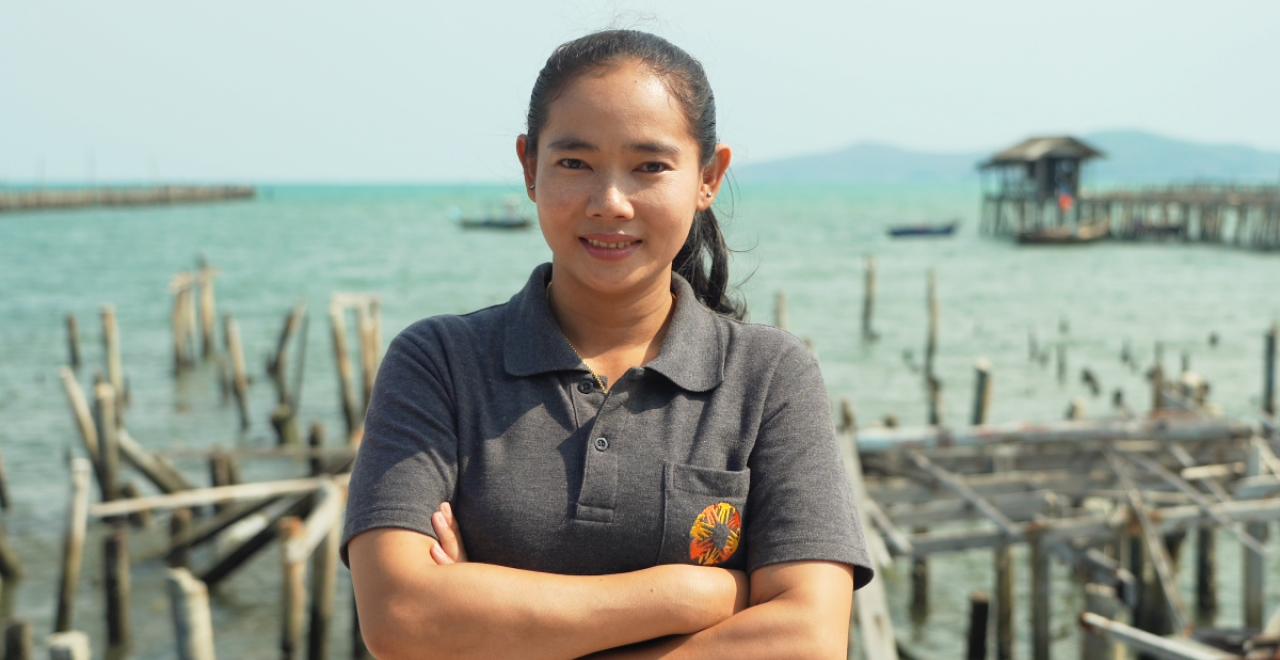
Sopheap Loem
At a seafood processing plant in Rayong province, rows of women empty bamboo baskets filled with fish onto a blue tarpaulin and spread them in the sun to dry. It’s hot, hard work - many of the women are on their feet for nine hours a day, six days a week – and the pay is low, around $1.20 per hour.
Sopheap Loem, 34, understands how difficult it can be because she used to work at a plant just like this one.
“When I first came to Thailand, I could barely speak and read Thai,” says Ms. Loem. “There are not many options for us.”
She moved to Thailand 15 years ago from neighbouring Cambodia while she was pregnant with her first son. Like many migrants, she came in search of a better life but found that the reality was nothing like she’d hoped. “I didn’t know my rights,” she says.
She was seven months into her pregnancy before she received any prenatal care.
“From that moment on, I felt like I wanted to provide help to others. I thought about those who could not speak Thai, just like me,” she says.
Ms. Loem now works for the Raks Thai Foundation, one of the implementing partners of Spotlight Initiative’s Safe and Fair programme. As Assistant to the Field Officer, she visits migrant women in their workplaces and homes to provide information about their rights. She travels to a different village each week, going door to door to listen to the challenges women face, interpreting for them at medical appointments and referring them to essential services.
Women make up almost half of migrants in the ASEAN region and there are almost three million registered migrant workers in Thailand alone.They are often concentrated in informal, low-paid labour including in agriculture, manufacturing, domestic work, construction and entertainment. While women migrant workers are at higher risk of violence, trafficking and exploitation, it is difficult for many to seek support due to the language barrier, limited availability of information and lack of support network. Ms. Loem says that even simple aspects of daily life can be problematic.
“One client who was pregnant didn’t have money for prenatal care,” says Ms. Loem. “She didn’t know when she was due so she went into labour unexpectedly at work.”
Ms. Loem called an ambulance but when it didn’t arrive in time, she delivered the woman’s baby herself. “Not many people get a chance to be in a situation like that,” she says.
“Another time, I got to take care of a female patient living with HIV and tuberculosis,” she says. Ms. Loem took her to hospital and helped the woman access medical care. “Now she is a strong woman, healthy and living with her kids. I’m proud of what I did.”
Raks Thai Foundation is currently developing a Thai curriculum for migrant workers to empower them to find higher paying work and build networks.
“If we can provide skills training, especially Thai language skills, it will help expand women’s job opportunities,” says Ms. Loem. “If they fall sick or if they experience violence and they can speak a little bit of Thai, then they’ll be able to communicate with doctors and other front line service providers. They’ll be able to help their friends and family members.”
She hopes that her own story inspires other migrants and gives them the confidence to exercise their rights.
“I feel like I am a mirror to those women looking at me. If I can do this kind of thing, so can they,” she says.
“We have the same rights as men. We just have to be confident, not look down on ourselves or think that we can’t achieve things because of our gender. We can do anything.”
Spotlight Initiative is helping activists like Sopheap Loem empower migrant women to understand and exercise their rights, including providing information on where to seek help if they experience violence. We are #WithHer. Are you?
Photo: Spotlight Initiative/Pichit Phromkade
